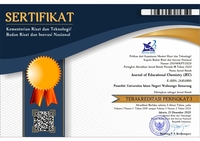Development of Learning Tools GOAL (Graphic Organizer-Based Argumentation Learning) Model to Improve Students' Argumentation Skills
DOI:
https://doi.org/10.21580/jec.2022.4.2.12191Keywords:
learning tools, GOAL model, argumentation skillsAbstract
This study aims to develop a learning tools GOAL model (Graphic Organizer-Based Argumentation Learning). The set of GOAL model is expected to be a chemistry learning tool that can improve students' argumentation skills. This study uses a Research and Development methodology with a 4-D design consisting of Define, Design, Develop and Disseminate. The results showed that: 1) the developed GOAL model tools consisting of lesson plans, LKPD, teaching materials, and assessment instruments with good validity. 2) GOAL model tools are easy to use by teachers and students during the learning process in class, and 3) GOAL model learning tools have high effectiveness in improving students' argumentation skills. These results indicate that the GOAL model can be applied in chemistry learning to improve students' argumentation skills.Downloads
References
Devi, N. D. C., Susanti VH, E., & Indriyanti, N. Y. 2018. Analysis of High School
Students’ Argumentation Ability in the topic of Buffer Solution. JKPK (Jurnal
Kimia dan Pendidikan Kimia), 3(3), 152-159.
Erika, F, Supardi, Z. & Tukiran. 2019. Development of Student Worksheet for
Improving the Self-efficacy and Ability to Argue of Chemistry Teacher Candidates. Advances in Computer Science Research, 95, 1–4.
Faize, F. A., Husain, W., & Nisar, F. 2018. A Critical Review of Scientific Argumentation in Science Education. Eurasia Journal of Mathematics, Science and Technology Education, 14(1), 475-483.
Konstantinidou, A. & Macagno, F. 2012. Understanding Students’ Reasoning: Argumentation Schemes as an Interpretation Method in Science Education. Sci & Educ 22, 1069–1087. https://doi.org/10.1007/s11191-012-9564-3
Mulyasa, E. 2006. Kurikulum Tingkat Satuan Pendidikan. Bandung: PT. Remaja Rosdakarya.
Lazarow, D. 2009. Learning to TAP: an Effort to Scaffold Students’ Argumentation in Science. Contemporary Science education Research: Scientific Literacy and Social Aspects of Science ESERA Conference.
Pratiwi, I. 2019. Efek Program PISA Terhadap Kurikulum di Indonesia. Jurnal Pendidikan dan Kebudayaan, 4(1), 51-71. https://doi.org/10.24832/jpnk.v4i1.1157
Miftah, R. & Orlando, A. R. 2016. Penggunaan Graphic Organizer dalam Meningkatkan Kemampuan Representasi Matematis Siswa. FIBONACCI: Jurnal Pendidikan Matematika & Matematika. 2(2). 76-89.
Nieveen, N. 1999. Prototype to Reach Product Quality. Dordrecht: Kluwer Academic Publisher.
Rahayu, C., Eliyarti, E., & Festiyed, F. 2019. Kepraktisan Perangkat Pembelajaran
Berbasis Model Generative Learning dengan Pendekatan Open-ended Problem. Berkala Ilmiah Pendidikan Fisika, 7(3), 164-176. https://doi.org/10.20527/bipf.v7i3.6139.
Reigeluth, C. M. 1999. Instructional Design Theories and Models Volume II: A New Paradigm of Instructional Theory. New Jersey: Lawrence Erlbaum Associates Publishers
Ruhimat, T., Ibrahim, & Sanjaya, W. 2013. Kurikulum dan Pembelajaran. Jakarta: PT. Raja Grafindo Persada.
Septyastuti, H. L., Sulistina, O., & Sigit, D. 2018. Pengaruh Pembelajaran Larutan Penyangga Model POGIL dan ADI Terhadap Keterampilan Argumentasi Ilmiah Peserta Didik SMA. J-PEK (Jurnal Pembelajaran Kimia), 3(1), 1–5.
https://doi.org/10.17977/um026v3i12018p001
Shinta D A, Suciati, & Maridi. 2017. Profil Keterampilan Argumentasi Siswa
SMA Negeri 5 Surakarta. Seminar Nasional Pendidikan Sains II Universitas Katholik Satya Wacana, 162–168.
Triyanto. 2010. Mendesain Model Pembelajaran Inovatif-Progresif. Jakarta: Kencana.
Yusup, F. 2018. Uji Validitas dan Reliabilitas Instrumen Penelitian Kuantitatif. Jurnal Tarbiyah: Jurnal Ilmiah Kependidikan, 7(1), 17-23.
Downloads
Published
How to Cite
Issue
Section
License
The copyright of the received article shall be assigned to the journal as the publisher of the journal. The intended copyright includes the right to publish the article in various forms (including reprints). The journal maintains the publishing rights to the published articles.
Authors are permitted to disseminate published articles by sharing the link/DOI of the article at the journal. Authors are allowed to use their articles for any legal purposes deemed necessary without written permission from the journal with an acknowledgment of initial publication to this journal.

This work is licensed under a Creative Commons Attribution-NonCommercial-ShareAlike 4.0 International License.


